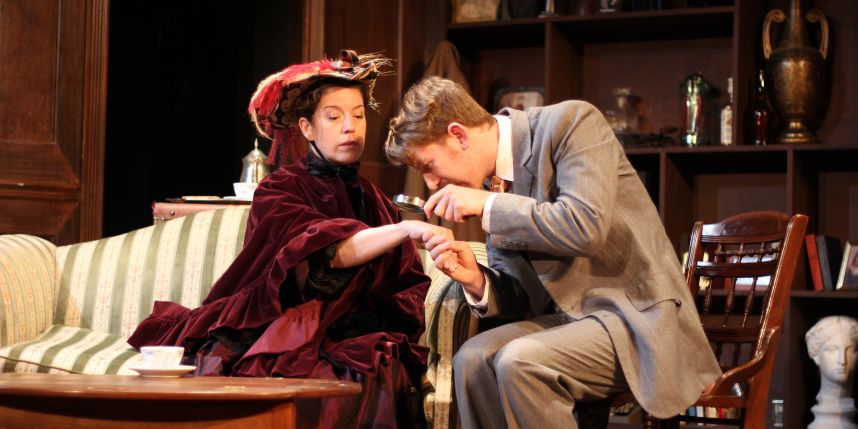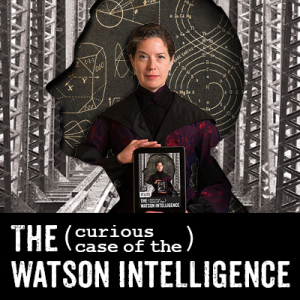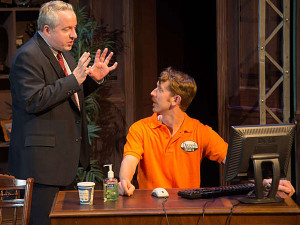
On March 10, 1876, the first ever telephone call from Alexander Graham Bell received by his assistant, Thomas A. Watson was “Mr. Watson—come here—I want to see you.”
As directed by Allison Heishman, THE (CURIOUS CASE OF THE) WATSON INTELLIGENCE is a thoroughly entertaining, beautifully staged exploration of trust, love, relationships, entanglement, dependency and technology and intimacy. Madeleine George’s play revisits these complex, overlapping themes while careening through time, from the later 1800s to modern times, via the viewpoints and interactions between Eliza (Corinna Burns), and Merrick (David Bardeen), a couple in stages of separation, and four very helpful Watsons; Watson the humanoid computer, Josh Watson the computer repairman, Dr. Watson, assistant to Sherlock Holmes, and Thomas A. Watson, assistant to Alexander Graham Bell (all adroitly played by Griffin Stanton-Ameisen).
 Eliza and Merrick are opposites. Modern day Eliza, a former IBM scientist, trusts her mechanical Watson to the point where she openly discusses her love life with “him”. Her computer geek lover, Josh Watson, shares many similar facets with similar to her mechanical Watson, but when she fully realizes the real distinction between the two, that Josh is human, she terminates the relationship with the man for fear that he will ultimately hurt her.
Eliza and Merrick are opposites. Modern day Eliza, a former IBM scientist, trusts her mechanical Watson to the point where she openly discusses her love life with “him”. Her computer geek lover, Josh Watson, shares many similar facets with similar to her mechanical Watson, but when she fully realizes the real distinction between the two, that Josh is human, she terminates the relationship with the man for fear that he will ultimately hurt her.
Merrick of the 19th century is plotting and measuring his wife Eliza of the same period, in order to make a mechanized version of her. Interacting with another person can be straining and implies some risk, but may be easier from behind today’s virtual walls and landscapes. Ironically, she meets Watson through her estranged, 20th-century, political-office-seeking husband, who enlists Josh Watson to spy on Eliza to see what she is up to. What goes around, comes around, input/output issues? An exploration of the general tendency to overly trust in computer generated information, then to blame the same computer for something that began with human error? Traipsing between the past and present to expose methods and means of connective technologies to possibly compare and contrast, this rich techno-comedy-drama raises these type of questions and many more, while remaining highly entertaining.
Indeed the show is packed with material to ponder, but there are also many comedic moments and some great laugh lines, especially in the form of responses to Eliza from Humanoid Computer Watson, such as when “he”, like Eliza, uses an expletive to garnish his statements, and in the manner, timing and intonation of “his” statements and questions. Griffin Stanton-Ameisen amazes in this role for his ability to swiftly transform into any one of the four the Watsons via changes in speech, mannerism and costume, yet always keeping consistent the sense of Watson’s eternal eagerness to be of assistance. Corinna Burns reactions to him, as Eliza, are engaging and believable, as is her attitude when being irked by just the thought of Merrick; is simply beautiful to behold. David Bardeen absolutely pops as Merrick, sizzling his monologues, and in the detail imbued in his expressions and speech.

The rich, versatile steampunk style set (Dirk Durosette) makes excellent use of stage space and is easy on the eyes! Smooth scene changes augmented by crisp sound effects and techno music (Larry Fowler) and cleverly designed lighting (Chris Hallenbeck), lends much towards helping to channel the audience in following the structure of the play, as does the continuity of color for each characters’ costume (Janus Stefanowicz) throughout all time periods.
To what extent is the practical application of knowledge in particular areas of our daily lives helpful? Can relationships benefit from it, or be doomed by it? Still don’t know. Even the last scene of the play, which has the feel of an epilogue to it, doesn’t provide answers. Perhaps the questions are what matters. They are like invitations to plough through and journey on, even though things could get messy along the way. [Off-Broad Street Theater, 1636 Sansom Street] November 5-23, 2014; azukatheatre.org.
